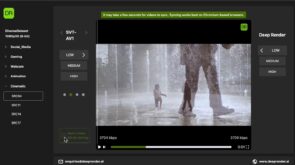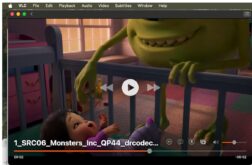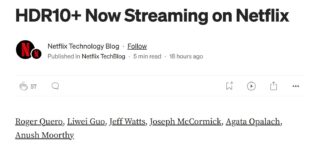Many 2021 model Smart TVs support AV1 decoding, making it a good time to start thinking about how to encode AV1 videos. A great way to start is our course Encoding with the AV1 Codec, which details how to encode AV1 encoded video with FFmpeg (libaom-av1), the Alliance for Open Media’s standalone aomenc encoder, Intel’s SVT-AV1, and Visionular’s Aurora1.
Would you design a SmartTV that couldn’t play UHD videos from YouTube? Me neither and designers from LG and Samsung apparently agree. I was researching codec support among smart TVs for upcoming training sessions at Streaming Media East and noticed that the 2020 version of the Samsung SmartTV supports AV1 decode. A quick search found an article on Flat Panels HD entitled YouTube now streaming 8K video on 8K TVs with AV1 support, which states:
LG and Samsung’s 2020 8K models are the first TVs to support AV1 hardware decoding. Below you see YouTube 8K (60fps) streaming to an LG 2020 8K LCD TV (NANO95 range). Yesterday, TCL said that its new X915 8K TV will also support YouTube 8K via AV1 but that an update to Android 10 (scheduled for later this year) will be required to enable it. Philips has told FlatpanelsHD that it is committed to AV1, too.
The article also mentions that YouTube videos seen on certain Android TV devices will also display AV1. As explained in this article on xda-developers.com, AV1 playback will likely only be enabled on devices with AV1 hardware.
Most SoCs in use on smartphones and Android TV boxes rely on software decoding for videos encoded in AV1, which can be taxing on the CPU and lead to higher power consumption. On the smartphone side, only the MediaTek Dimensity 1000 is capable of decoding AV1, while only a handful of recent SoCs used in Android TV devices support hardware-accelerated AV1 decoding. Those include Broadcom’s bcm72190/72180 and Realtek’s RTD1311/RTD1319.
AOMedia told us back in 2018 that it would take two years for hardware-based AV1 decoding to arrive on smartphones and smart TVs and now we’re seeing the first wave. This makes it even more important for producers to be up to speed regarding the latest on codecs and deployments.
 Streaming Learning Center Where Streaming Professionals Learn to Excel
Streaming Learning Center Where Streaming Professionals Learn to Excel










Hello Mr. Ozer,
I have studied your course that is available on Udemy, and it was very useful to me.
I am a beginner in this domain, and would like to get your advise on how to become an expert in video streaming and monitoring ( i.e. QoE and QoS ).
If you can advise about courses and software for practicing
Thank you
Ameer
Ameer:
Thanks for your note. The best course is Streaming Media 101 which includes high-level modules on QoE and QoS and exercises that familiarize you with tools like FFmpeg, Bitrate Viewer, MediaInfo, the Moscow State University Video Quality Measurement Tool, HandBrake and others. Here’s a link to the course.
https://courses.streaminglearningcenter.com/courses/streaming101
Good luck – Jan Ozer